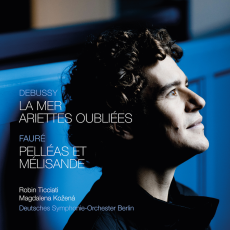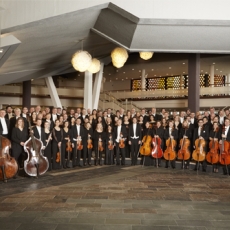Robin Ticciati & DSO - Debussy & Faure - The Music Gala
The present recording highlights the close connection between two composers who lived and worked in France in the same years and who were linked not only by musical choices, but also by their personal events: Gabriel Fauré and Claude Debussy.
When Debussy made his debut on the musical scene, Fauré was already the doyen of the French composers. His reputation was sound and his name revered. It is not by chance that many younger composers (included Debussy) imitated his style. In few years, however, Debussy had already made a name for himself. His own works had eclipsed those by Fauré with the same title. It happened in fact that Fauré’s incidental music for Maurice Maeterlinck’s play Pelléas et Mélisande was forgotten shortly after its premiere (1898). On the contrary, Debussy’s opera (1902) is still one of his most performed and best known works.
Moreover, both Debussy and Fauré set to music Verlaine’s verses. The six Ariettes Oubliées Debussy dedicated to Mary Garden (the first Mélisande) are part of the present recording. Also La mer, which was criticized when it premiered in 1905, is now one of Debussy’s most frequently performed works. As it were not enough, Debussy married Fauré’s former lover Emma Bardac.
The present recording includes two works by each composer. This is the first album made by Robin Ticciati and the Deutsches Symphonie-Orchester Berlin, the orchestra of which he has recently being appointed Music Director.
Fauré: Prelude to Pénelope and Pelléas et Mélisande
In Ticciati’s rendition, Fauré’s works are marked by soft and intense colours, which are darker in the Prelude and more luminous in the suite. As in the rest of the album, the sound is rich and it allows you to infer all the “voices” of the instruments. The Deutsches Symphonie-Orchester Berlin stands out for its fine playing and lustrous tone. Moreover, Ticciati reveals a particular attention to climaxes (which will recur also in the Ariettes Oubliées and, in a more extensive way, in La mer), which are carefully prepared thanks to the smoothness of the orchestra and the use of dynamics.
Debussy: Ariettes Oubliées
Brett Dean’s orchestrated version of Debussy’s Ariettes Oubliées receives here its world premiere recording. The first performance took place in Sidney in 2015. Mezzosoprano Magdalena Kožená, who sang at the premiere, was therefore a natural choice for this recording. By the way, Kožená’s interest for Debussy is not a novelty as she sang the role of Mélisande in the recording of Pélleas et Mélisande released at the end of 2017.
In the present recording, Kožená is quite expressive. Even though her singing is too much affected in some passages, in her best moments she can be really poetic. Her voice is not always pleasant to hear as sometimes she is imprecise and her high notes are quite strident.
As for Ticciati and the orchestra, they are as good as before and some of the atmospheres the silky sound of the strings are able to create are simply unforgettable.
Debussy: La mer
The same precision and lucidity of Fauré’s works returns in La mer too. Dark colours characterize the beginning of the first movement. Shortly after, it becomes broad and poetic thanks to the warm and intense sound of the strings and to the suggestive woodwinds. The entire work is energetic (especially in third movement) and emphasizes the “nocturnal” sounds, as the careful and balanced interaction of the instruments reveals throughout the work. Next to them, however, there are also shimmering passages where silvery colours are dominant. The contrast gives the impression of a wide, extensive horizon.



